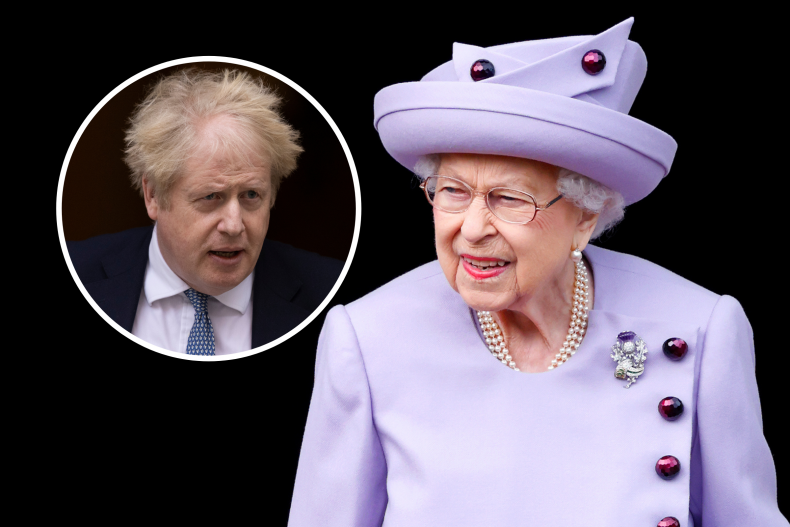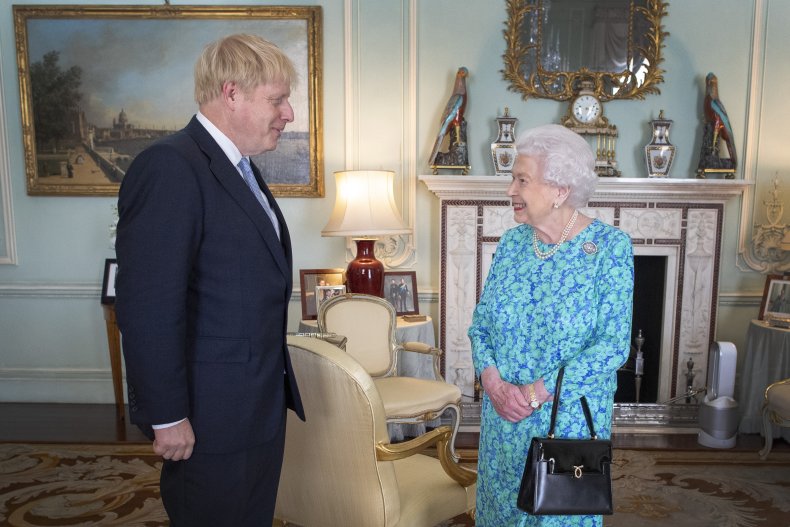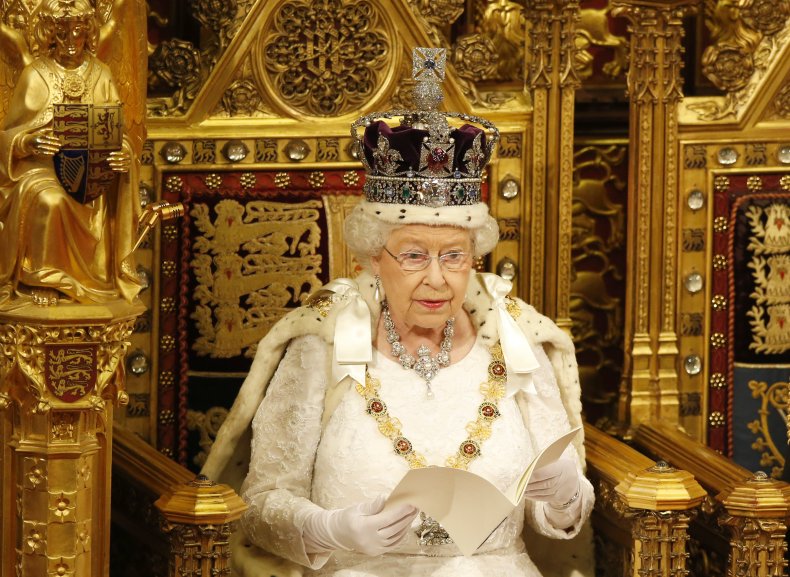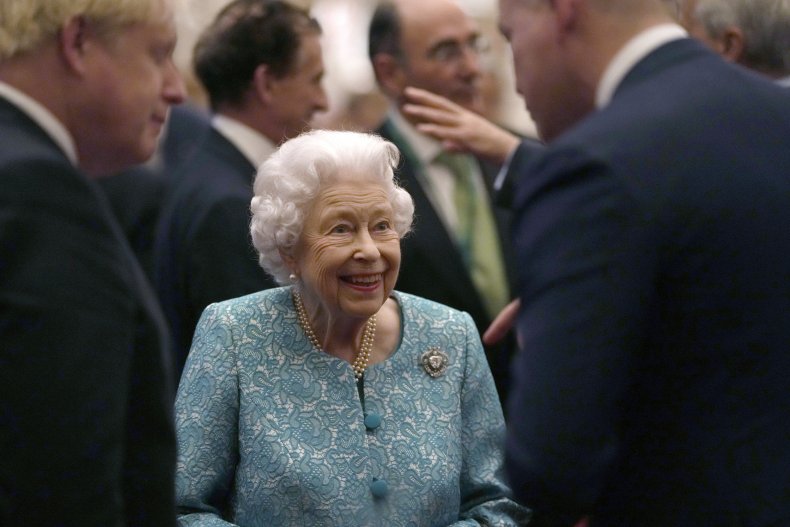Queen Elizabeth II’s constitutional role as monarch could have been called into action over a political storm in Britain which saw Prime Minister Boris Johnson step down after over 50 members of his government resigned over his handling of sexual assault allegations against a Conservative member of parliament (MP).
Johnson’s intention to resign was announced after tense days of political scrutiny following revelations that he had been aware of groping allegations made against MP Chris Pincher before promoting him, despite No. 10 initially denying this.
Political and personal scandals have plagued Johnson’s premiership since taking office in 2019.
Had he not stepped down, it was feared the prime minister would attempt to call a snap election hoping that the public would vote to save his job. This would have placed the queen at the center of a difficult political storm.

Max Mumby/Indigo/Getty Images/Dan Kitwood/Getty Images
The Queen and Boris Johnson
The queen and Johnson have maintained their constitutional contact throughout the pandemic and beyond with weekly phone calls and sporadic face-to-face meetings at Windsor Castle. As sovereign it is her right to be “consulted” on the issues facing the government of the day and also has the right to “encourage” and “warn” the prime minister, though she is expected to remain politically neutral.
It is also the queen’s duty to appoint a prime minister. Following a general election, where the British public have democratically elected a leader, that leader is invited to Buckingham Palace for the queen to officially appoint.
Beyond the reading of the queen’s speech, which is written by the government, and her rights to be consulted, to advise and warn, the monarch has limited involvement with individuals in government, instead performing her ceremonial duties and royal assent.
There are, however, times where she is bound to act on the advice of the prime minister when certain political storms arise.
For Johnson, this previously occurred in 2019 when he was accused of misleading the queen—which he since fervently denied—in asking her to suspend parliament for five weeks in what was seen by critics as an attempt to prevent criticism of the government’s Brexit plan.

Victoria Jones/WPA Pool/Getty Images
Johnson was accused of leading the queen to believe that this suspension was legal, however, the British High Court ruled that it was not and that in doing so it had “the effect of frustrating or preventing the ability of parliament to carry out its constitutional functions without reasonable justification.”
This placed the queen in a difficult position. The politically neutral monarch had, on the advice of her prime minister, unwittingly suspended parliament illegally.
This political storm subsided and the queen and Johnson appeared to carry out their duties as normal following the High Court’s ruling.
How Could the Queen Have Been Asked To Help?
If Johnson had attempted to hold on to power, it was the queen who could have proved a major roadblock to achieving this.
In an appearance before the House of Commons liaison committee on Wednesday, amid the growing list of party resignations, Johnson hinted that he could have been prepared to call a snap general election which would see the British public asked to vote on a new government before the end of the four-year term.
This could have potentially seen Johnson kept in office by the will of the people, negating calls for a resignation from within his party.
What stood between Johnson and a snap election was the queen.
Legally, Johnson would have needed the monarch to sign a document dissolving Parliament in order to call an election. This she could have turned down if the request did not meet certain requirements.
Two sources list these requirements. The first being the “dissolution principles” as laid out by the government. This states that two core principles inform a prime minister’s right to ask the monarch to dissolve Parliament so that an election can be held; the first that they be the accepted head of the House of Commons, and the second that in asking for the dissolving of Parliament, the leader is not letting the monarch be “drawn into party politics.”

Alastair Grant/WPA Pool/Getty Images
The second source is known as the “Lascelles Principles” which is a British constitutional convention first written in a letter to The Times in 1950 by King George VI’s private secretary. This lists the reasons that a monarch can refuse a request to dissolve Parliament.
These reasons include the existing Parliament being deemed “vital, viable, and capable of doing its job,” as well as relying on the fact that the monarch is able to find “another prime minister who could govern for a reasonable period with a working majority in the House of Commons.”
The “Lascelles Principles” also state that the monarch can deny the prime minister’s request for dissolution if the move would prove “detrimental to the national economy.”
Would the Queen Have Denied Johnson a Snap Election?
So far in her historic 70-year reign, the queen has not denied a prime minister their request to dissolve parliament, thus allowing for a snap election.
Given her duty to remain politically neutral and act on the advice of her government, it is likely that the monarch holds it for the public to decide the political future of the country and that it is not her place to stand in the way of the due political process.
Therefore, if Johnson were to have pushed through with a bid for a snap election, it is unlikely that the queen would have objected so long as it was done in accordance with the law.
With news of Johnson’s resignation though, the 96-year-old queen has been saved from having to wade into this difficult political issue. Her next step will be to receive Johnson’s official resignation before formally acknowledging his replacement which will be determined in a Conservative leadership race.

Alastair Grant/Pool/Getty Images




More Stories
Qualities of a Good Personal Injury Attorney
EU Wants A Special Court To Try Russia For Ukraine War Crimes
Tories On Hunt for New Party Attack Dog – Guido Fawkes